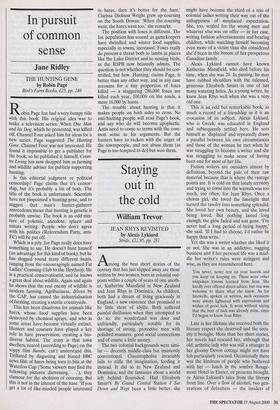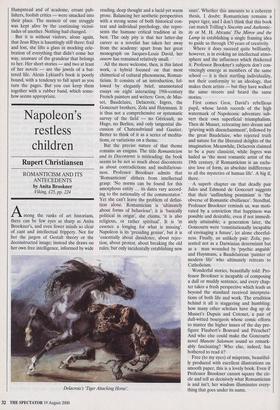Staying out in the cold
William Trevor
JEAN RHYS REVISITED ED by Alexis Lykiard Stride, £11.95, pp. 281 Among the best short stories of the century that has just slipped away are those written by two women born in colonial out- posts within a couple of years of one anoth- er, Katherine Mansfield in New Zealand and Jean Rhys in Dominica. As children, both had a dream of living graciously in England, a new existence that promised to be little short of idyllic. Both suffered painful disillusion when they attempted to do so: the wonderland was dour and unfriendly, particularly notable for its shortage of strong, protective men with polished manners, good social connections and of course a little money.
The two colonial backgrounds were simi- lar — decently middle-class but insistently conventional. Claustrophobia invariably fails to stifle the imagination, feeding it instead. It did so in New Zealand and Dominica, and the fantasies about a world left behind flourished. Had Elizabeth Smart's By Grand Central Station I Sat Down and Wept been a little better, she might have become the third of a trio of colonial ladies writing their way out of the unhappiness of misplaced expectation. She, too, settled for the wrong men and whatever else was on offer — in her case, writing fashion advertisements and bearing children, while watching herself becoming even more of a victim than she considered she'd been in the bosom of her prosperous Canadian family.
Alexis Lykiard cannot have known Katherine Mansfield, who died before his time, when she was 24. In passing, he may have rubbed shoulders with the talented, generous Elizabeth Smart in one of her many watering holes. As a young writer, he knew Jean Rhys well when she was a very old one.
This is an odd but remarkable book, as much a record of a friendship as it is an evocation of its subject. Alexis Lykiard, who is Greek, was educated in England and subsequently settled here. He sees himself as 'displaced' and repeatedly draws a parallel between his own circumstances and those of the woman he met when he was struggling to become a writer and she was struggling to make sense of having been one for most of her life.
Fiction writers are outsiders almost by definition, beyond the pale of their raw material because that is where the vantage points are. It is cold on that lonely territory and trying to come into the warmth was too much, too often, for Jean Rhys. Once a chorus girl, she loved the limelight that turned the tawdry into something splendid. She loved her own beauty, and she loved being loved. But nothing lasted long enough; the glow faded and was gone. 'I've never had a long period of being happy,' she said. 'If I had to choose, I'd rather be happy than write.'
Yet she was a writer whether she liked it or not. She was in an addictive, nagging business and if her personal life was a mud- dle her writer's rules were stringent and wise, as they are remembered here.
You never, never rest on your laurels and you keep on keeping on. These were other unspoken lessons learned from Jean. She hardly ever offered direct advice, but one was welcome to share what she knew. As for farewells, spoken or written, such occasions were always lightened with expressions and wishes of good luck. It went without saying that the best of luck was already mine, since I'd begun to know Jean Rhys.
Late in her lifetime she received both the literary respect she deserved and the secu- rity it brought. More than her short stories, her novels had rescued her, although that old, arthritic lady who was still a stranger in her gloomy Devon cottage might not have felt particularly rescued. Occasionally there was the kindness of people who bothered with her — lunch in the sombre Rouge- mont Hotel in Exeter, or presents brought, or Alexis Lykiard's tales from the literary front line. Over a flow of alcohol, two gen- erations of defaulters — the insiders of Hampstead and of academe, errant pub- lishers, foolish critics — were smacked into their place. The memoir of one struggle was kept alive by the continuing vicissi- tudes of another. Nothing had changed.
But it is without visitors, alone again, that Jean Rhys is hauntingly still there: frail and lost, she lifts a glass in mocking cele- bration of everything that didn't come her way, unaware of the grandeur that belongs to her. Her short stories — and two at least of her novels — are the jewels of a bat- tered life. Alexis Lykiard's book is poorly bound, with a tendency to fall apart as you turn the pages. But you can keep them together with a rubber band, which some- how seems appropriate.



























































 Previous page
Previous page